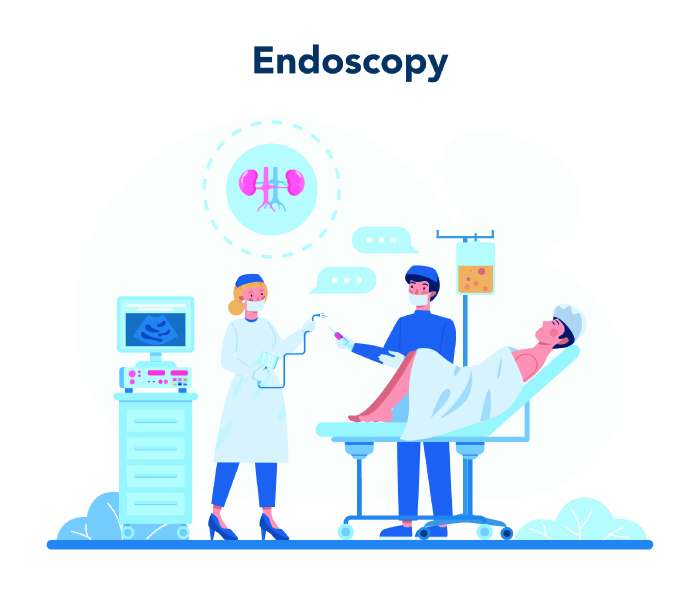Urological endoscopy Treatment & Diagnostics in Chirag Enclave, Delhi
A Painless Surgical answer to Urological Treatment - Urological endoscopy
Urological endoscopy is a painless diagnostic method to treat urological problems. Consult with a cystoscopy specialist near you if suffering from painful kidney stones or UTI problems.
Overview
Urological endoscopy treats urological anomalies with little or no pain. It requires no skin incision while using the urogenital tract to detect the problem. Also known as cystoscopy, a cost-effective and painless method.
A Cystoscopy diagnosis helps locate the affected cell masses without affecting the surrounding tissues. To learn more about urological endoscopy, consult with a cystoscopy specialist near you.
What is Urological endoscopy?
Urological endoscopy or cystoscopy is a minimally invasive surgical procedure to treat urological complications. It uses a cystoscope (a sterilized tube with a high-intensity camera and light attached to its head).
During urological endoscopy, the cystoscope enters the urogenital tract till it reaches the urinary bladder. The urologist near you uses the cystoscope to detect any cellular anomalies on a big screen. Local anesthesia makes cystoscopy painless while eliminating the need for skin incision.

Are there any health risks associated with Urological endoscopy?
Urological endoscopy is a state-of-art diagnosis to detect anomalies in the urinary system. It shows no antagonistic effects on the target organs. Post cystoscopy, one can experience;
- Inflammation and swelling of urinary tract
- Little discomfort during urination
- Leaking of urine
- Irritation and anxiety
- Infection and UTI risks
If you experience blood in urine, it might be a sign of underlying trauma due to cystoscopy. Do not panic, and consult with a cystoscopy specialist near you.
How to prepare before undergoing Urological endoscopy?
Cystoscopy follows the minimally invasive principle. No dermal incision happens. Get admitted to any cystoscopy hospital near you for a mandatory overnight observation. Before undergoing urological endoscopy, one must;
- Collection of urine samples to detect any underlying anomalies
- The urinary bladder should stay empty
- Application of sedative ointments around the urethral opening to numb sensation
- Men may feel discomfort when the cystoscope crawls through the urogenital tract to reach the urinary bladder
- For women having pregnancy issues, consult with a urologist near you before undergoing cystoscopy
What to expect from the test results of Urological endoscopy?
The test results of cystoscopy only highlight the anomalies preventing your urinary system from harmony. Consult with a cystoscopy specialist near you to learn more about treatment procedures. Understand your specific condition because most are treatable through medications.
A urologist near you may suggest Laparoscopy to eliminate tissues (malignant or tumor-like polyps), failing to neutralize them using drug therapy.
Share your concerns and confusions about your condition with your loved ones. Urological problems are treatable through early detection and curable through prompt treatment.
What are the possible outcomes of Urological endoscopy?
Urological endoscopy imparts a clear status of your urological system. Cystoscopy helps detect the following conditions;
- Kidney stones present in the urinary bladder
- Bladder cancer or tumorous structures
- Urogenital infections
- Enlarged Prostate gland
- Blockages in the ureters that transport urine from the kidney to the bladder
If the urologist near you suspects malignant tissues, they may prescribe you to undergo a biopsy examination.
When to consult a physician?
Does it pain or an unpleasant burning sensation while you pee? It might be a chronic urinary tract infection or kidney stones in the urinary bladder. Consult with a kidney stone specialist near you right away.
Request an appointment at Apollo Spectra Hospitals, Chirag Enclave, Delhi.
Call 1860 500 2244 to book an appointment.
Conclusion
Urological endoscopy helps troubleshoot any urogenital complications. Do not neglect if you feel discomfort while passing urine or suffer from prolonged micturition troubles. Consult with a cystoscopy specialist near you to have an early diagnosis right away.
References
https://my.clevelandclinic.org/health/diagnostics/16553-cystoscopy
Urological endoscopy helps detect any abnormalities in the urinogenital duct. If you have STD and are yet to get treated, share your concerns with a cystoscopy doctor near you.
The urinary duct and reproductive tract are separate in women. Post urological endoscopy, you may have some troubles with urination. Your menstruation cycle has nothing to do with the same.
Men have a longer urinary tract than women. Even after applying local anesthesia, men may feel significant sensitivity or discomfort during urological endoscopy. The following causes no damage to the penile structure or fertility of men.
Symptoms
Our Top Specialities
NOTICE BOARD
CONTACT US
CONTACT US
 Book Appointment
Book Appointment


.svg)
.svg)
.svg)
.svg)








